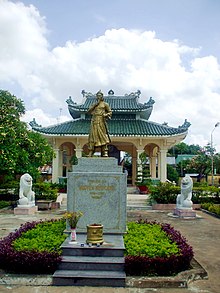Nguyễn Hữu Cảnh
| Nguyễn Hữu Cảnh | |||||||||||||
|---|---|---|---|---|---|---|---|---|---|---|---|---|---|
| Founder of Saigon-Gia Dịnh | |||||||||||||
 | |||||||||||||
| Reign | 1650– 1700 | ||||||||||||
| Born | 1650 Quảng Bình Province | ||||||||||||
| Died | 1700 | ||||||||||||
| |||||||||||||
| House | Nguyễn Lords | ||||||||||||
| Father | Nguyễn Hữu Dật | ||||||||||||
| Mother | Nguyễn Thị Thiện | ||||||||||||
| Religion | Buddhism | ||||||||||||


Lễ Thành Hầu Nguyễn Hữu Cảnh or Nguyễn Hữu Kính, (阮有鏡), (1650–1700?) was a general of Lord Nguyễn Phúc Chu.[1] He is considered the one who established territorial sovereignty for Vietnam in Saigon and Gia Định regions in 1698. From that time, these regions officially became part of Vietnam.
Biography
Nguyễn Hữu Cảnh was born in Lệ Thủy District, Quảng Bình Province, Bắc Trung Bộ, Vietnam (then part of Đàng Trong). In 1698, Canh was sent by Nguyễn Phúc Tru to the south. He founded Gia Dinh garrison there. He called on people from many places in Central Vietnam to settle in these regions. He ordered the building of roads, canals, markets. Saigon has turned into a busy port city since then.[2]
Conferred Titles & Posthumous Name
Below is the list of conferred titles & posthumous name bestowed upon Lễ Thành Hầu Nguyễn Hữu Cảnh by Vietnamese monarchs.
- was bestowed before 1692
- Lễ Thành Hầu
- Chinese: 禮成侯
- English: the Marquis of Ideal Ritual Observation
- Vietnamese: phong cho ông tước là vị Hầu thông suốt lễ nghi
- Lễ Thành Hầu
- was bestowed upon his death, in 1767[11]
- Hiệp tán công thần, đặc tiến Chưởng dinh, thụy Trung Cần
- Chinese: 協贊工臣, 特進掌營, 謚忠勤
- English: His Honorable Assistant Attaché, specifically promoted to the post of Provincial Military Governor, posthumously named Loyal & Diligent Statesman
- Vietnamese: phong cho ông mỹ hiệu quan Hiệp tán, và đặc phong cho ông chức Chưởng dinh, với thụy hiệu là vị quan trung thành với triều đình và cần mẫn trong việc nước
- Hiệp tán công thần, đặc tiến Chưởng dinh, thụy Trung Cần
- was bestowed in 1822 in the royal decree conferred to đình Bình Kính (Binh Kinh Communal House), Bien Hoa
- Thác Cảnh Uy Viễn Chiêu Ứng Thượng Đẳng Thần
- Chinese: 拓境威遠昭應上等神
- English: Top-Rank Deity for which His contribution in frontier development & Numinous Grace is far reaching and profound
- Vietnamese: phong cho ông mỹ hiệu là vị Thượng đẳng thần linh ứng và uy danh khai khẩn đất đai vang dội lẫy lừng
- Thác Cảnh Uy Viễn Chiêu Ứng Thượng Đẳng Thần
- was bestowed in 1843 in the royal decree conferred to đình Bình Kính (Binh Kinh Communal House), Bien Hoa - added 2 honorific words - Thành Cảm
- Thác Cảnh Uy Viễn Chiêu Ứng Thành Cảm Thượng Đẳng Thần
- Chinese: 拓境威遠昭應誠感上等神
- English: Top-Rank Deity for which His contribution in frontier development & Numinous Grace with Influential Reply is far reaching and profound
- Vietnamese: phong cho ông mỹ hiệu là vị Thượng đẳng thần linh ứng và uy danh khai khẩn đất đai vang dội lẫy lừng
- Thác Cảnh Uy Viễn Chiêu Ứng Thành Cảm Thượng Đẳng Thần
- was bestowed in 1843 in the second royal decree conferred to đình Bình Kính (Binh Kinh Communal House), Bien Hoa - added 2 honorific words - Hiển Linh
- Thác Cảnh Uy Viễn Chiêu Ứng Thành Cảm Hiển Linh Thượng Đẳng Thần
- Chinese: 拓境威遠昭應誠感上等神
- English: Celestial Top-Rank Deity for which His contribution in frontier development & Numinous Grace with Influential Reply is far reaching and profound
- Vietnamese: phong cho ông mỹ hiệu là vị Hiển linh Thượng đẳng thần linh ứng và uy danh khai khẩn đất đai vang dội lẫy lừng
- Thác Cảnh Uy Viễn Chiêu Ứng Thành Cảm Hiển Linh Thượng Đẳng Thần
- was bestowed in 1850 in the royal decree conferred to đình Bình Kính (Binh Kinh Communal House), Bien Hoa - added 2 honorific words - Trác Vĩ
- Thác Cảnh Uy Viễn Chiêu Ứng Thành Cảm Hiển Linh Trác Vĩ Thượng Đẳng Thần
- Chinese: 拓境威遠昭應誠感卓偉上等神
- English: Eminently Celestial Top-Rank Deity for which His contribution in frontier development & Numinous Grace with Influential Reply is far reaching and profound
- Vietnamese: phong cho ông mỹ hiệu là vị Hiển linh Kiệt xuất Thượng đẳng thần linh ứng và uy danh khai khẩn đất đai vang dội lẫy lừng
- Thác Cảnh Uy Viễn Chiêu Ứng Thành Cảm Hiển Linh Trác Vĩ Thượng Đẳng Thần
References
- ^ Ngọc Hiền Nguyễn Lễ Thành Hầu Nguyễn Hữu Cảnh, 1650-1700 1995
- ^ Erik Harms Saigon's Edge: On the Margins of Ho Chi Minh City 2011 - Page 37 "Although most sources identify the founding of what is now Ho Chi Minh City with the military occupation of the area, the naming of districts, and the establishment of administrative works by Nguyễn Hữu Cảnh in 1698, Professor Nguyễn Đình Đầu argues that it did not become a true “city” until Nguyễn Cửu Đàm built a citadel there in 1772 to protect against the danger of Siamese ."
